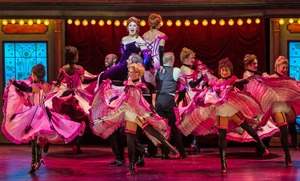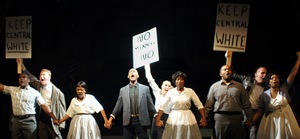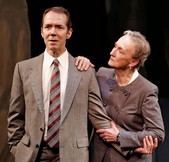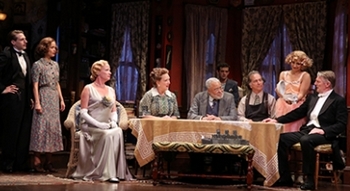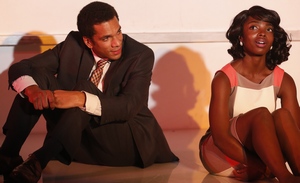
MaameYaa Boafo and Biko Eisen-Martin
An explosion, an act of terrorism, has devastated the upper
floors of a high-rise Manhattan office building, the offices of a large law
firm. Two employees find themselves trapped within an elevator that has only
one unstable cable holding it from falling. Stuck between the upper floors, the
elevator provide a place for its conflicted occupants, previously strangers to
each other, to meet and grapple with the choices they have made. The situation for
them gets worse when a second explosion sends the elevator plunging down a
little further, hurling them both to the floor, but uninjured.
With no active signal from their cell-phones, unable to
reach out for help or figure out what they can do, these young, attractive,
upwardly mobile African-American co-workers Theodore "Big Time"
Southmore (Biko Eisen-Martin) and Tina Pardon (MaameYaa Boafo) are destined to find
out more than they probably ever wanted to know about each other as they are
forced to confront the very real possibility of a horrifying death unless they
are rescued soon.
This play, a Crossroads Theatre production, which had its
world premiere last April at the Crossroads Theater in New Brunswick, is by
popular novelist Walter Mosley, who is most famous for his gritty gumshoe
series that features detective Easy Rawlins (Denzel Washington played him in
the film version of "Devil in a
Blue Dress"). Mosley takes an interesting premise to create suspense and tension. The predicament in which Theodore and
Tina find themselves lends itself to exploring how people respond to an
emergency. But for dramatic substance, the play allows its two principle
characters to both address and reveal certain aspects of their lives that they
would ordinarily not have the opportunity or the inclination to divulge.
Being trapped for a lengthy period of time in an elevator
with someone whose behavior becomes as increasingly unstable as the elevator
would seem like a natural set-up for developing an unusual relationship,
especially in the light of our having been exposed to two other characters who
are introduced and then summarily discarded. Prior to the explosion, you might
easily think that a comedy rather than a drama was a-foot. Judging by the
giggles that came from the audience during this episode and for much of the
dialogue, especially in the play's early moments, it takes a long time for the play to regain its
composure.
Before the catastrophe, we are in the company of John Thomas
Resterly (Martin Kushner) a senior partner in the law offices where Theodore
works, and to Noni Tariq (Shavonna Banks) a sexy, sassy young woman who has become
Tina's friend and is part of the secretarial pool within the firm. All four
share the elevator for a short period of time giving the white, middle-aged Resterly
a chance to give an embarrassing rant that is clearly meant to define him as a
racist, bigot and a class A jerk. Give Kushner a nod for making us cringe and
hope that Westerly's presence is temporary which it is. Now give Banks a good
grade for making clear that Noni is a walking, talking cliché whose every word bespeaks
authoritative condescension. Dispensing with Resterly's recitative and Noni's
incomprehensible rudeness to Theodore, our full attention is given to Theodore
and Tina, he who is having seizures of some sort at regular intervals and she
who is having systematic recurrences of hysteria.
Considering their inherent dilemma, the unlikelihood of a
quick rescue and the very real likelihood of a relationship born out of stress,
need and dependence, the play provides the opportunity for each to reveal their
back stories, with Tina's more contrived than is Theodore's. Are we surprised
if a bond is obligatory as they move from contempt to compassion for each
other. Structured as a series of very short scenes that convey the passing of
time, the play is at its best as it decodes Tina and Theodore's secret lives.
Two acts with too many scenes that are more enervating than
interesting, however, test our patience.
A ten-minute intermission requires us to look at Tina as she examines the walls
of the elevator. This, while Theodore cowers in the corner is not a good choice
either for the actors or for the audience that doesn't know when it would be
polite to get up and go (not necessarily leave but rather go to the restroom).
Climbing the walls is what I suspect some audience members
might have considered while Theodore and Tina attempt to get to that meaningful
place where their troubled lives are put back into perspective mostly by
helping each other. With no help forthcoming for others in other elevators, an
incredulous suicide is wedged into the
plot. The actors, however, perform admirably, under Marshal Jones III's
direction and respond commendably to the demands of a script that needs more
than some judicious pruning to make its plot and its characters simply
credible. We don't need the slight tilt of the elevator, the work of set
designer Andrei Onegin, for us to see how in need of basic structural repair is
this "Lift." Simon Saltzman
"Lift"
(through November 30, 2014)
59E59 Theaters, 59 East 59th Street, New York
For tickets ($70.00) call (212) 279 - 4200

